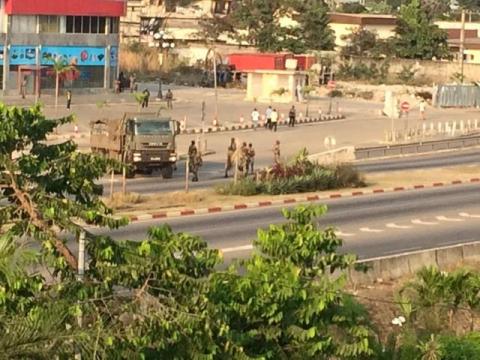Advertisement
Over 1,000 arrested as post-election riots rage in Gabon
LIBREVILLE (Reuters) - Three people were killed and up to 1,100 were arrested in Gabon on Thursday, the government said, in a second day of rioting over the announcement of President Ali Bongo's re-election and his main rival's accusation that the vote was rigged.
Opposition challenger Jean Ping accused the elections commission of inflating Bongo's score to hand him a slim victory and extend his family's nearly half-century rule in the oil-producing Central African country for another seven years.
Ping called on Bongo to step down.
Violent protests raged in at least nine neighborhoods of the capital Libreville, two witnesses and a police source said on Thursday, a day after demonstrators set fire to the parliament building following the results announcement.
"We want everyone to see, to tour the city, to witness the level of devastation, destruction, violence organized by certain politicians who do not want to recognize their defeat," Interior Minister Pacome Moubelet Boubeya said.
He told a news conference that several television stations, supermarkets, shops, and private homes had been looted in Libreville and the city hall was targeted by arsonists. Violence erupted in several other cities and provinces as well, he said.
Moubelet Boubeya said protesters had used grenades and police had seized AK-47 assault rifles, an accusation an opposition spokesman rejected.
Gabon's sovereign dollar bonds fell across the curve with the 2024 and 2025 issue hitting a seven-week low on the back of the violence.
Ping told Reuters in an interview that two people were killed and others wounded when the presidential guard assaulted his party headquarters overnight.
He called for international assistance to protect the population against what he described as "a rogue state".
"The only solution is that Bongo recognizes defeat, because he was beaten," Ping later told France's BFM TV. He said that contesting the results through Gabon's constitutional court, the official channel for complaints, was pointless.
"The constitutional court, like Gabon's electoral commission, is a tool of the governing authority. They do what they are told to do," he said.
Bongo's office accused the Ping camp of planning "coordinated attacks on symbols of the state", adding that security forces had in response encircled Ping's headquarters and clashed with his supporters, resulting in one death.
WHO WON? WHO LOST?
"The elections gave their verdict. I know who won and who lost," Bongo, first elected in 2009 upon the death of his father Omar Bongo, Gabon's president for 42 years, told reporters on Thursday. "Who lost? A small group whose only aim is to take power for themselves."
The United Nations called for restraint. Former colonial ruler France, the United States and the European Union urged the authorities to release polling station results for greater transparency. Bongo's spokesman rejected the request.
"Transparency exists," Alain-Claude Bilie By Nze told BFM TV. "Those who want a bureau by bureau count will only be able to do this by going through the constitutional court."
On Thursday, a witness reported hearing gunfire and blasts in the Nkembo neighborhood, near Libreville's city center, while another saw protesters pillage shops, turn over rubbish bins to block streets and smash cars in the Avea neighborhood.
A heavy police and army presence was visible on the streets throughout the city.
"This is just a consequence of the current situation. This is because of the victory of Bongo against Jean Ping," said witness Alex Mbadinga, 32.
Libreville residents said the internet was cut on Thursday. Social media networks including Twitter and Facebook stopped functioning overnight. Earlier in the week, customs officials seized satellite telephones they said had been imported illegally.
PATRONAGE SYSTEM
French Foreign Minister Jean-Marc Ayrault said there was no room for violence within the political process. "I'm calling, therefore, all parties to exercise the utmost restraint to avoid additional victims."
The office of French President Francois Hollande also called for calm, which "means a process to ensure transparency in the election results".
Bongo won 49.80 percent of votes in Saturday's election against 48.23 percent for Ping, according to results read by Moubelet Boubeya on Wednesday. The announcement had been delayed by one day.
Bongo benefited from a patronage system lubricated by oil money ahead of the vote.
But economic headwinds caused by falling oil prices and crude production have led to budget cuts in one of Africa's statistically wealthiest nations, providing fuel for opposition charges that many ordinary Gabonese citizens have not enjoyed the fruits of oil wealth and suffered under his rule.
The government says it plans to diversify the economy through investments in manganese mining and cash crops like palm oil and rubber.
Ping, a political insider who has served as foreign minister and African Union Commission chairman, was a close ally of the late president and fathered two children with his daughter.
An EU observer mission criticized a "lack of transparency" among institutions running the election and said Bongo had benefited from preferential access to money and the media.
(Additional reporting by Matthew Mpoke Bigg in Accra, Tim Cocks in Dakar, Joe Bavier in Abidjan and John Irish in Paris; Writing by Joe Bavier and Tim Cocks; Editing Mark Heinrich)



















Add new comment